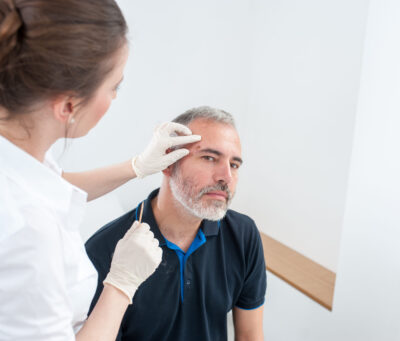
Jimmy Buffett’s Skin Cancer: What you need to know about Merkel cell carcinoma
This article was edited by Annie Liu, MD
Jimmy Buffett, the singer-songwriter whose music celebrated the coastal life of sea, sand, and sun, died September 1 at age 75. The cause of death was a type of skin cancer called Merkel cell carcinoma.
Here on the West Coast, we Californians should take note. As we mourn the loss of this American icon, we need to be aware that Merkel cell carcinoma, like all skin cancers, results mostly from unprotected exposure to the sun. And we’ve got plenty of year-round sun.
So what is Merkel cell carcinoma?
Merkel cells exist deep in the epidermis, the skin’s top layer. Their connections to nerve endings help our sense of touch. Most skin cancers happen higher up in epidermal layers nearer the skin’s surface. Merkel cell carcinoma is rare – 40 times rarer than melanoma. There’s about one case of Merkel cell carcinoma per 130,000 people in the U.S. But when Merkel cell carcinoma hits, it can hit hard.
Just how lethal is Merkel cell carcinoma?
This is an aggressive fast-moving skin cancer. It’s also likely to return and spread within two to three years of diagnosis. Jimmy Buffet died after four years of battling the disease. Sadly, Merkel cell carcinoma is the second highest cause of skin cancer death after melanoma.
What does Merkel cell carcinoma look like?
Jimmy Buffett initially may have thought he just had a blister or a blocked hair follicle or pimple. That’s because Merkel cell carcinoma presents as a painless reddish bump on the skin. But then as the cancer cells multiply, the tumor starts to grow.
Where does Merkel cell carcinoma show up?
Likely sites for Merkel cell carcinoma include the face, tops of the ears, back of the neck, arms, legs, torso – any part of you that gets lots of sun.
Who is most likely to get Merkel cell carcinoma?
Merkel cell carcinoma occurs most in people who:
- are over 50, particularly white males
- are immunocompromised, perhaps from organ transplants or having another type of cancer
- have a history of exposure to UV radiation, primarily sun exposure
Why white males over 50? Light skin provides less natural protection against UV exposure than darker skin. Also men tend to worry less about wrinkles than women and/or may be invulnerable. Especially when they’re young. So they may skip sunscreen. But decades of UV damage can take its toll.
Can Merkel cell carcinoma be cured?
Merkel cell carcinoma can be curable with surgical and nonsurgical therapies if caught early. Treatments are highly individualized depending on a patient’s overall health and the tumor’s location, size, depth, and whether it has spread.
In most cases, the first step usually includes surgical removal of the primary tumor with either MOHS surgery or excision. Next steps can include one or more of the following:
- Radiation
- Immunotherapy
- Chemotherapy
Best bet? Stop Merkel cell carcinoma before it starts
As with all skin cancers, the best offense is a good defense. And the best defense involves a two-pronged approach:
Sun protection
- Avoid the sun during the hottest part of the day if possible.
- Seek shade and wear protective clothing, especially a wide-brimmed hat.
- Slather on a quality sunscreen that’s right for your skin and reapply every few hours.
Skin Cancer Screening
While you should be checking your skin regularly yourself, a dermatologist can examine areas you can’t see – for instance, your back and the top of your scalp. Plus, a dermatologist knows what to look for.
Unlike other preventive screenings such as bone density or a colonoscopy, a skin cancer screening involves no medical imaging tools. Just the trained eye of your board-certified CSI dermatologist.
If we see something suspicious during your skin screening, we’ll immediately biopsy it. Most biopsies do not result in a cancer diagnosis. But if a biopsy is positive, we’ll start working with you right away to develop a treatment plan that is best for you. We can treat most skin cancers in the office.
Make an appointment today to see your CSI dermatologist for a skin cancer screening.



 / 291 Reviews
/ 291 Reviews